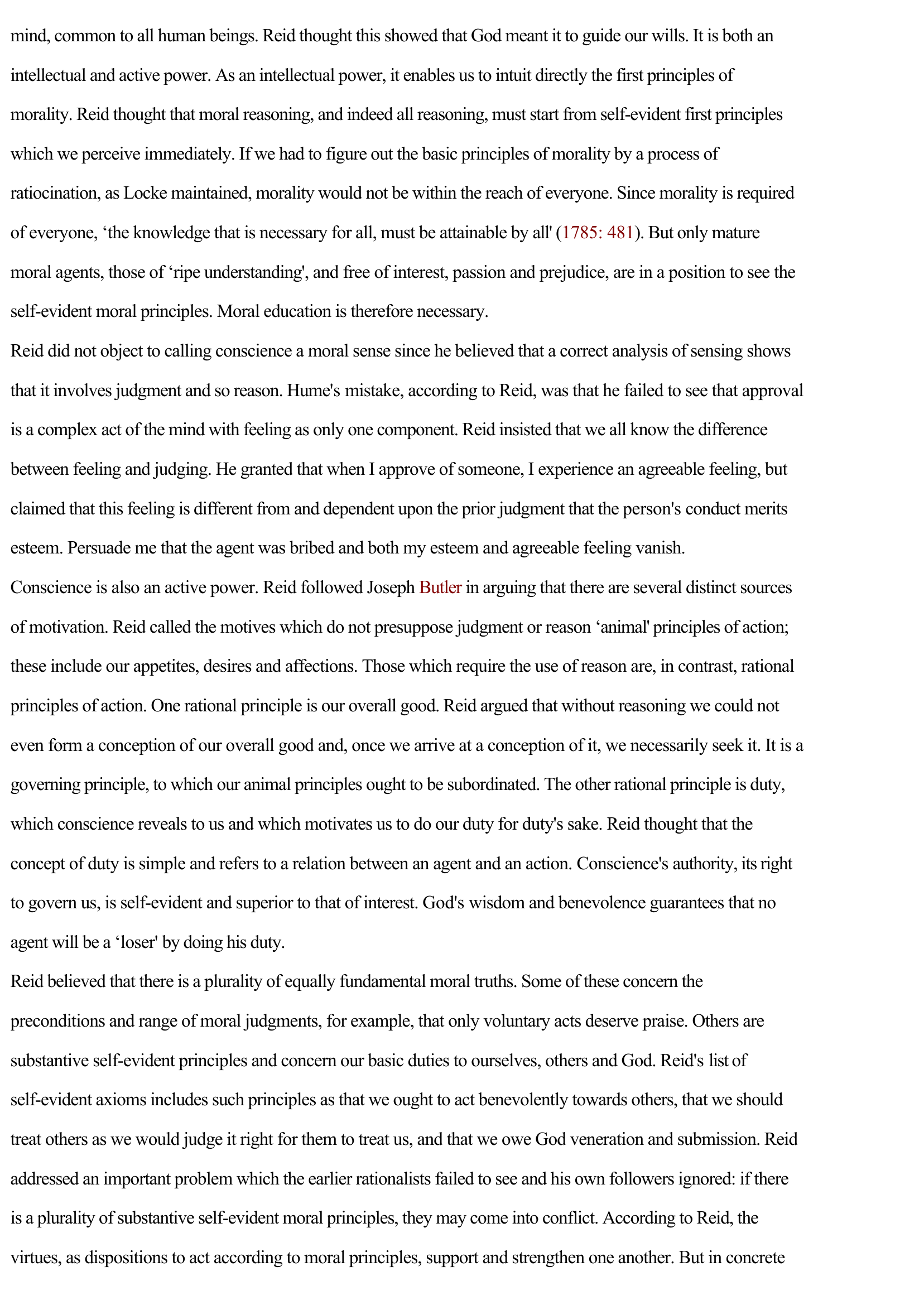Common-sense ethics
Publié le 22/02/2012

Extrait du document
«
mind, common to all human beings.
Reid thought this showed that God meant it to guide our wills.
It is both an
intellectual and active power.
As an intellectual power, it enables us to intuit directly the first principles of
morality.
Reid thought that moral reasoning, and indeed all reasoning, must start from self-evident first principles
which we perceive immediately.
If we had to figure out the basic principles of morality by a process of
ratiocination, as Locke maintained, morality would not be within the reach of everyone.
Since morality is required
of everyone, ‘the knowledge that is necessary for all, must be attainable by all' (1785: 481 ).
But only mature
moral agents, those of ‘ripe understanding' , and free of interest, passion and prejudice, are in a position to see the
self-evident moral principles.
Moral education is therefore necessary.
Reid did not object to calling conscience a moral sense since he believed that a correct analysis of sensing shows
that it involves judgment and so reason.
Hume 's mistake, according to Reid, was that he failed to see that approval
is a complex act of the mind with feeling as only one component.
Reid insisted that we all know the difference
between feeling and judging.
He granted that when I approve of someone, I experience an agreeable feeling, but
claimed that this feeling is different from and dependent upon the prior judgment that the person's conduct merits
esteem.
Persuade me that the agent was bribed and both my esteem and agreeable feeling vanish.
Conscience is also an active power.
Reid followed Joseph Butler in arguing that there are several distinct sources
of motivation.
Reid called the motives which do not presuppose judgment or reason ‘animal' principles of action;
these include our appetites, desires and affections.
Those which require the use of reason are, in contrast, rational
principles of action.
One rational principle is our overall good.
Reid argued that without reasoning we could not
even form a conception of our overall good and, once we arrive at a conception of it, we necessarily seek it.
It is a
governing principle, to which our animal principles ought to be subordinated.
The other rational principle is duty,
which conscience reveals to us and which motivates us to do our duty for duty's sake.
Reid thought that the
concept of duty is simple and refers to a relation between an agent and an action.
Conscience's authority, its right
to govern us, is self-evident and superior to that of interest.
God's wisdom and benevolence guarantees that no
agent will be a ‘loser' by doing his duty.
Reid believed that there is a plurality of equally fundamental moral truths.
Some of these concern the
preconditions and range of moral judgments, for example, that only voluntary acts deserve praise.
Others are
substantive self-evident principles and concern our basic duties to ourselves, others and God.
Reid 's list of
self-evident axioms includes such principles as that we ought to act benevolently towards others, that we should
treat others as we would judge it right for them to treat us, and that we owe God veneration and submission.
Reid
addressed an important problem which the earlier rationalists failed to see and his own followers ignored: if there
is a plurality of substantive self-evident moral principles, they may come into conflict.
According to Reid, the
virtues, as dispositions to act according to moral principles, support and strengthen one another.
But in concrete.
»
↓↓↓ APERÇU DU DOCUMENT ↓↓↓
Liens utiles
- REID AND COMMON SENSE - HUME
- theories of Common-sense reasoning
- What are reasons and why do they matter in ethics?
- Aristotle Nicomachean Ethics
- Business ethics project


